Analysis of Learning and Development in a Business Environment
VerifiedAdded on 2023/06/04
|11
|3126
|83
Report
AI Summary
This report delves into the critical importance of learning and development within a business context, emphasizing its role in enhancing employee skills and organizational competitiveness. It begins by defining organizational learning and its impact on employee capabilities and adaptability in a dynamic environment. The main body of the report critically appraises various learning development theories, models, and practices. It covers Kolb’s Learning Style model (Concrete Experience, Reflective Observation, Abstract Conceptualisation, Active Experimentation) and the 4MAT Learning model (Why, What, How, What if), detailing how these frameworks facilitate effective learning and engagement among employees. The report highlights the significance of continuous learning, employee retention, and the creation of a positive work environment. By analyzing these theories and models, the report aims to provide insights into how organizations can foster a culture of continuous learning and development to achieve their strategic goals. The report concludes by summarizing the key findings and reiterating the benefits of investing in learning and development initiatives.
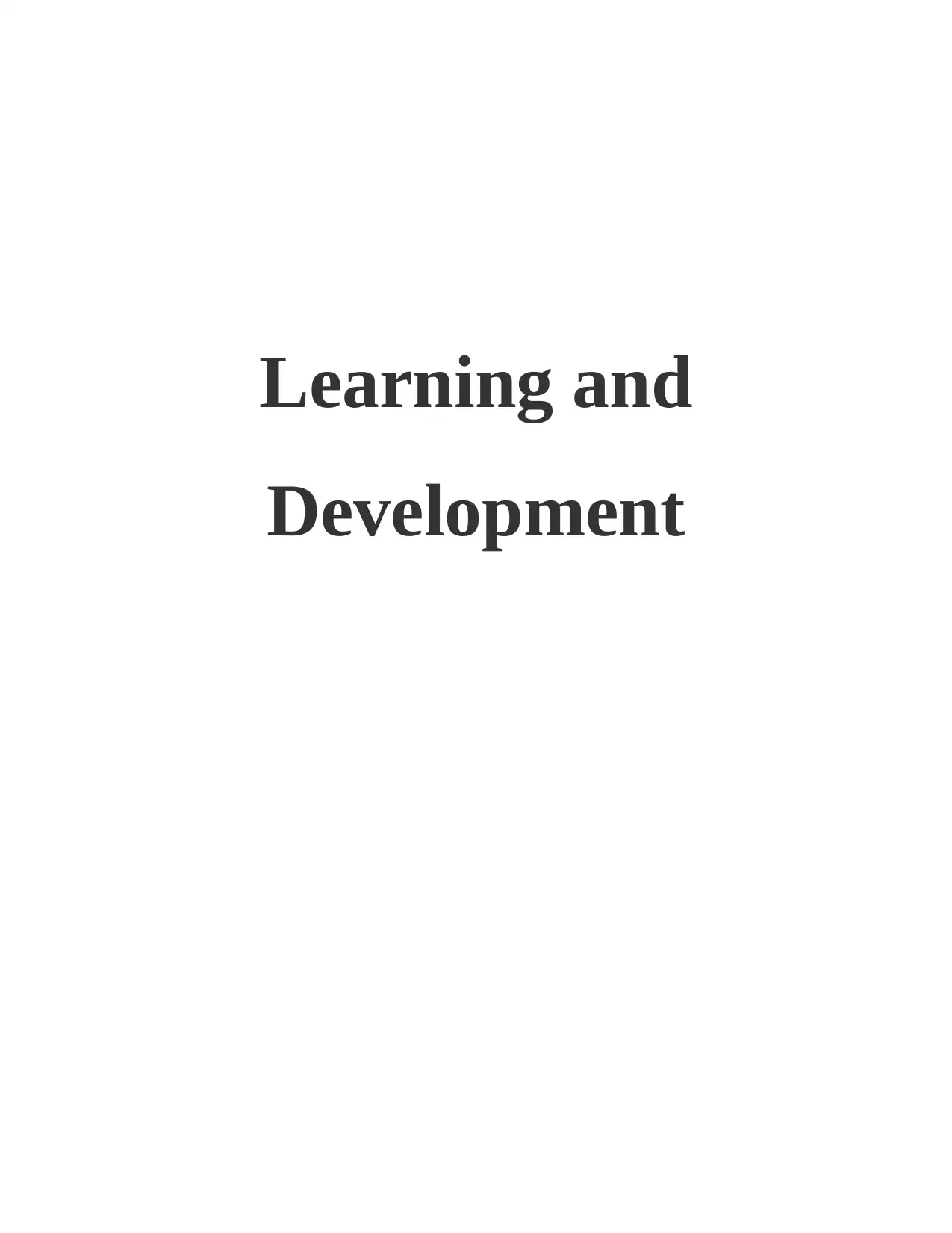
Learning and
Development
Development
Paraphrase This Document
Need a fresh take? Get an instant paraphrase of this document with our AI Paraphraser
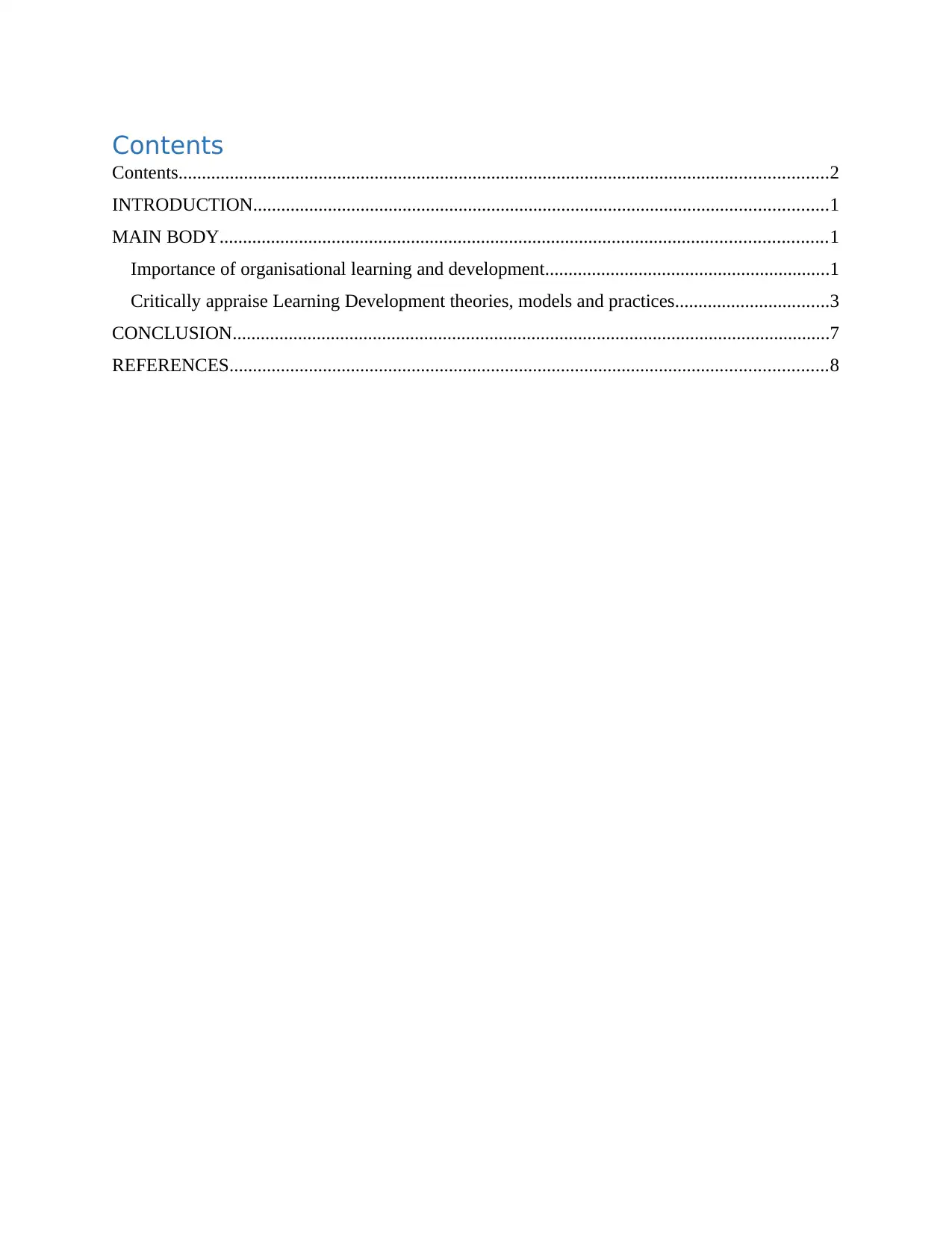
Contents
Contents...........................................................................................................................................2
INTRODUCTION...........................................................................................................................1
MAIN BODY..................................................................................................................................1
Importance of organisational learning and development.............................................................1
Critically appraise Learning Development theories, models and practices.................................3
CONCLUSION................................................................................................................................7
REFERENCES................................................................................................................................8
Contents...........................................................................................................................................2
INTRODUCTION...........................................................................................................................1
MAIN BODY..................................................................................................................................1
Importance of organisational learning and development.............................................................1
Critically appraise Learning Development theories, models and practices.................................3
CONCLUSION................................................................................................................................7
REFERENCES................................................................................................................................8
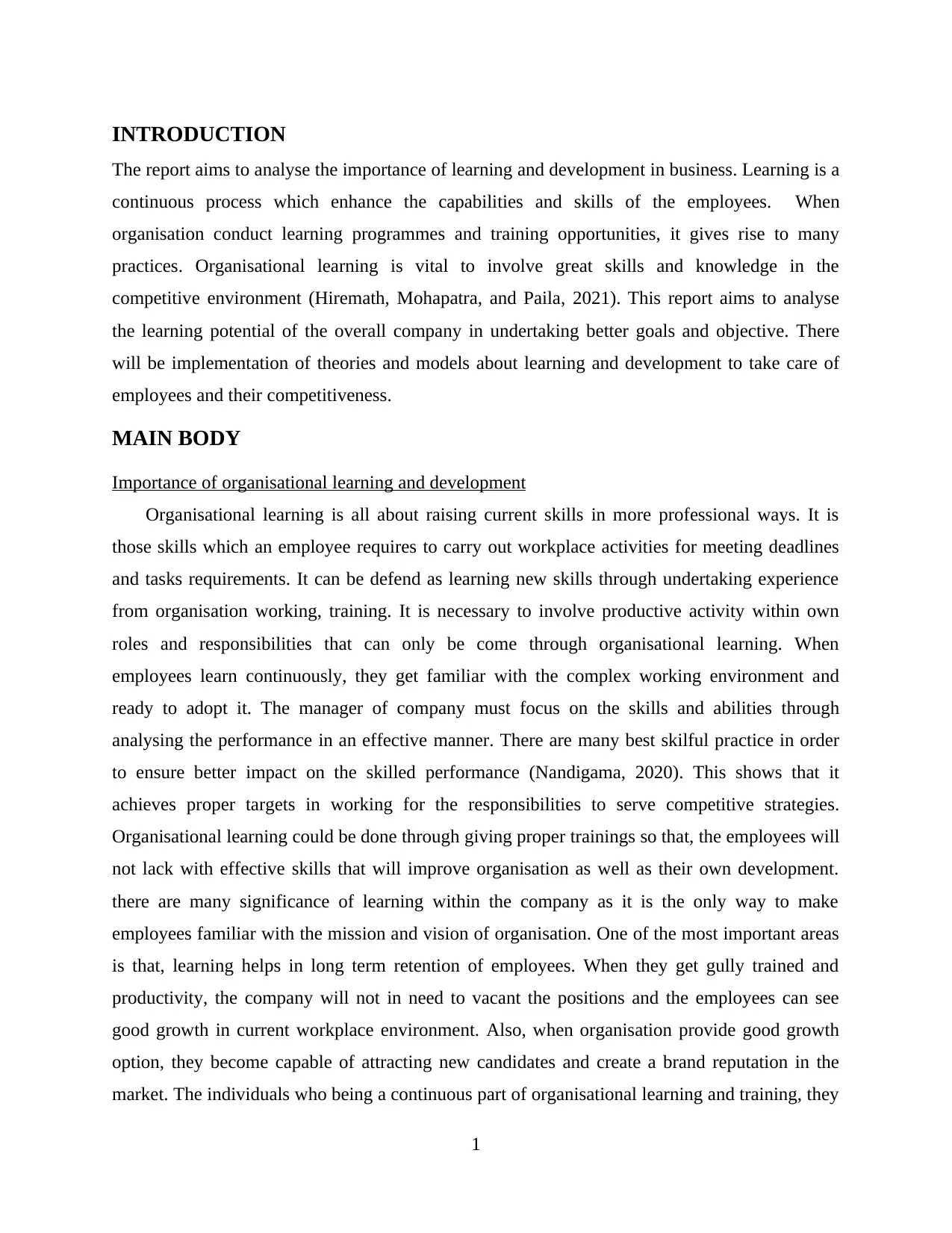
INTRODUCTION
The report aims to analyse the importance of learning and development in business. Learning is a
continuous process which enhance the capabilities and skills of the employees. When
organisation conduct learning programmes and training opportunities, it gives rise to many
practices. Organisational learning is vital to involve great skills and knowledge in the
competitive environment (Hiremath, Mohapatra, and Paila, 2021). This report aims to analyse
the learning potential of the overall company in undertaking better goals and objective. There
will be implementation of theories and models about learning and development to take care of
employees and their competitiveness.
MAIN BODY
Importance of organisational learning and development
Organisational learning is all about raising current skills in more professional ways. It is
those skills which an employee requires to carry out workplace activities for meeting deadlines
and tasks requirements. It can be defend as learning new skills through undertaking experience
from organisation working, training. It is necessary to involve productive activity within own
roles and responsibilities that can only be come through organisational learning. When
employees learn continuously, they get familiar with the complex working environment and
ready to adopt it. The manager of company must focus on the skills and abilities through
analysing the performance in an effective manner. There are many best skilful practice in order
to ensure better impact on the skilled performance (Nandigama, 2020). This shows that it
achieves proper targets in working for the responsibilities to serve competitive strategies.
Organisational learning could be done through giving proper trainings so that, the employees will
not lack with effective skills that will improve organisation as well as their own development.
there are many significance of learning within the company as it is the only way to make
employees familiar with the mission and vision of organisation. One of the most important areas
is that, learning helps in long term retention of employees. When they get gully trained and
productivity, the company will not in need to vacant the positions and the employees can see
good growth in current workplace environment. Also, when organisation provide good growth
option, they become capable of attracting new candidates and create a brand reputation in the
market. The individuals who being a continuous part of organisational learning and training, they
1
The report aims to analyse the importance of learning and development in business. Learning is a
continuous process which enhance the capabilities and skills of the employees. When
organisation conduct learning programmes and training opportunities, it gives rise to many
practices. Organisational learning is vital to involve great skills and knowledge in the
competitive environment (Hiremath, Mohapatra, and Paila, 2021). This report aims to analyse
the learning potential of the overall company in undertaking better goals and objective. There
will be implementation of theories and models about learning and development to take care of
employees and their competitiveness.
MAIN BODY
Importance of organisational learning and development
Organisational learning is all about raising current skills in more professional ways. It is
those skills which an employee requires to carry out workplace activities for meeting deadlines
and tasks requirements. It can be defend as learning new skills through undertaking experience
from organisation working, training. It is necessary to involve productive activity within own
roles and responsibilities that can only be come through organisational learning. When
employees learn continuously, they get familiar with the complex working environment and
ready to adopt it. The manager of company must focus on the skills and abilities through
analysing the performance in an effective manner. There are many best skilful practice in order
to ensure better impact on the skilled performance (Nandigama, 2020). This shows that it
achieves proper targets in working for the responsibilities to serve competitive strategies.
Organisational learning could be done through giving proper trainings so that, the employees will
not lack with effective skills that will improve organisation as well as their own development.
there are many significance of learning within the company as it is the only way to make
employees familiar with the mission and vision of organisation. One of the most important areas
is that, learning helps in long term retention of employees. When they get gully trained and
productivity, the company will not in need to vacant the positions and the employees can see
good growth in current workplace environment. Also, when organisation provide good growth
option, they become capable of attracting new candidates and create a brand reputation in the
market. The individuals who being a continuous part of organisational learning and training, they
1
⊘ This is a preview!⊘
Do you want full access?
Subscribe today to unlock all pages.

Trusted by 1+ million students worldwide
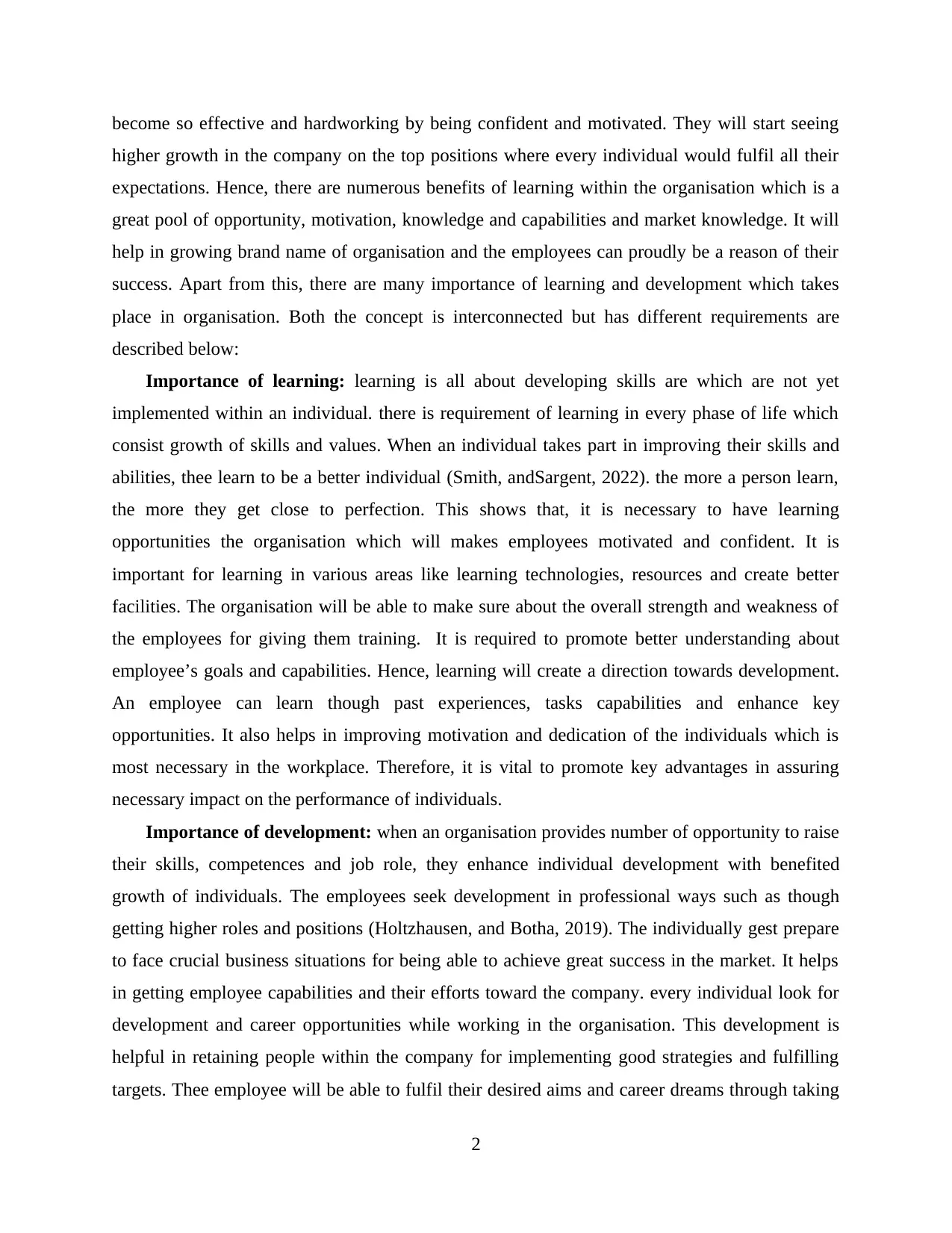
become so effective and hardworking by being confident and motivated. They will start seeing
higher growth in the company on the top positions where every individual would fulfil all their
expectations. Hence, there are numerous benefits of learning within the organisation which is a
great pool of opportunity, motivation, knowledge and capabilities and market knowledge. It will
help in growing brand name of organisation and the employees can proudly be a reason of their
success. Apart from this, there are many importance of learning and development which takes
place in organisation. Both the concept is interconnected but has different requirements are
described below:
Importance of learning: learning is all about developing skills are which are not yet
implemented within an individual. there is requirement of learning in every phase of life which
consist growth of skills and values. When an individual takes part in improving their skills and
abilities, thee learn to be a better individual (Smith, andSargent, 2022). the more a person learn,
the more they get close to perfection. This shows that, it is necessary to have learning
opportunities the organisation which will makes employees motivated and confident. It is
important for learning in various areas like learning technologies, resources and create better
facilities. The organisation will be able to make sure about the overall strength and weakness of
the employees for giving them training. It is required to promote better understanding about
employee’s goals and capabilities. Hence, learning will create a direction towards development.
An employee can learn though past experiences, tasks capabilities and enhance key
opportunities. It also helps in improving motivation and dedication of the individuals which is
most necessary in the workplace. Therefore, it is vital to promote key advantages in assuring
necessary impact on the performance of individuals.
Importance of development: when an organisation provides number of opportunity to raise
their skills, competences and job role, they enhance individual development with benefited
growth of individuals. The employees seek development in professional ways such as though
getting higher roles and positions (Holtzhausen, and Botha, 2019). The individually gest prepare
to face crucial business situations for being able to achieve great success in the market. It helps
in getting employee capabilities and their efforts toward the company. every individual look for
development and career opportunities while working in the organisation. This development is
helpful in retaining people within the company for implementing good strategies and fulfilling
targets. Thee employee will be able to fulfil their desired aims and career dreams through taking
2
higher growth in the company on the top positions where every individual would fulfil all their
expectations. Hence, there are numerous benefits of learning within the organisation which is a
great pool of opportunity, motivation, knowledge and capabilities and market knowledge. It will
help in growing brand name of organisation and the employees can proudly be a reason of their
success. Apart from this, there are many importance of learning and development which takes
place in organisation. Both the concept is interconnected but has different requirements are
described below:
Importance of learning: learning is all about developing skills are which are not yet
implemented within an individual. there is requirement of learning in every phase of life which
consist growth of skills and values. When an individual takes part in improving their skills and
abilities, thee learn to be a better individual (Smith, andSargent, 2022). the more a person learn,
the more they get close to perfection. This shows that, it is necessary to have learning
opportunities the organisation which will makes employees motivated and confident. It is
important for learning in various areas like learning technologies, resources and create better
facilities. The organisation will be able to make sure about the overall strength and weakness of
the employees for giving them training. It is required to promote better understanding about
employee’s goals and capabilities. Hence, learning will create a direction towards development.
An employee can learn though past experiences, tasks capabilities and enhance key
opportunities. It also helps in improving motivation and dedication of the individuals which is
most necessary in the workplace. Therefore, it is vital to promote key advantages in assuring
necessary impact on the performance of individuals.
Importance of development: when an organisation provides number of opportunity to raise
their skills, competences and job role, they enhance individual development with benefited
growth of individuals. The employees seek development in professional ways such as though
getting higher roles and positions (Holtzhausen, and Botha, 2019). The individually gest prepare
to face crucial business situations for being able to achieve great success in the market. It helps
in getting employee capabilities and their efforts toward the company. every individual look for
development and career opportunities while working in the organisation. This development is
helpful in retaining people within the company for implementing good strategies and fulfilling
targets. Thee employee will be able to fulfil their desired aims and career dreams through taking
2
Paraphrase This Document
Need a fresh take? Get an instant paraphrase of this document with our AI Paraphraser
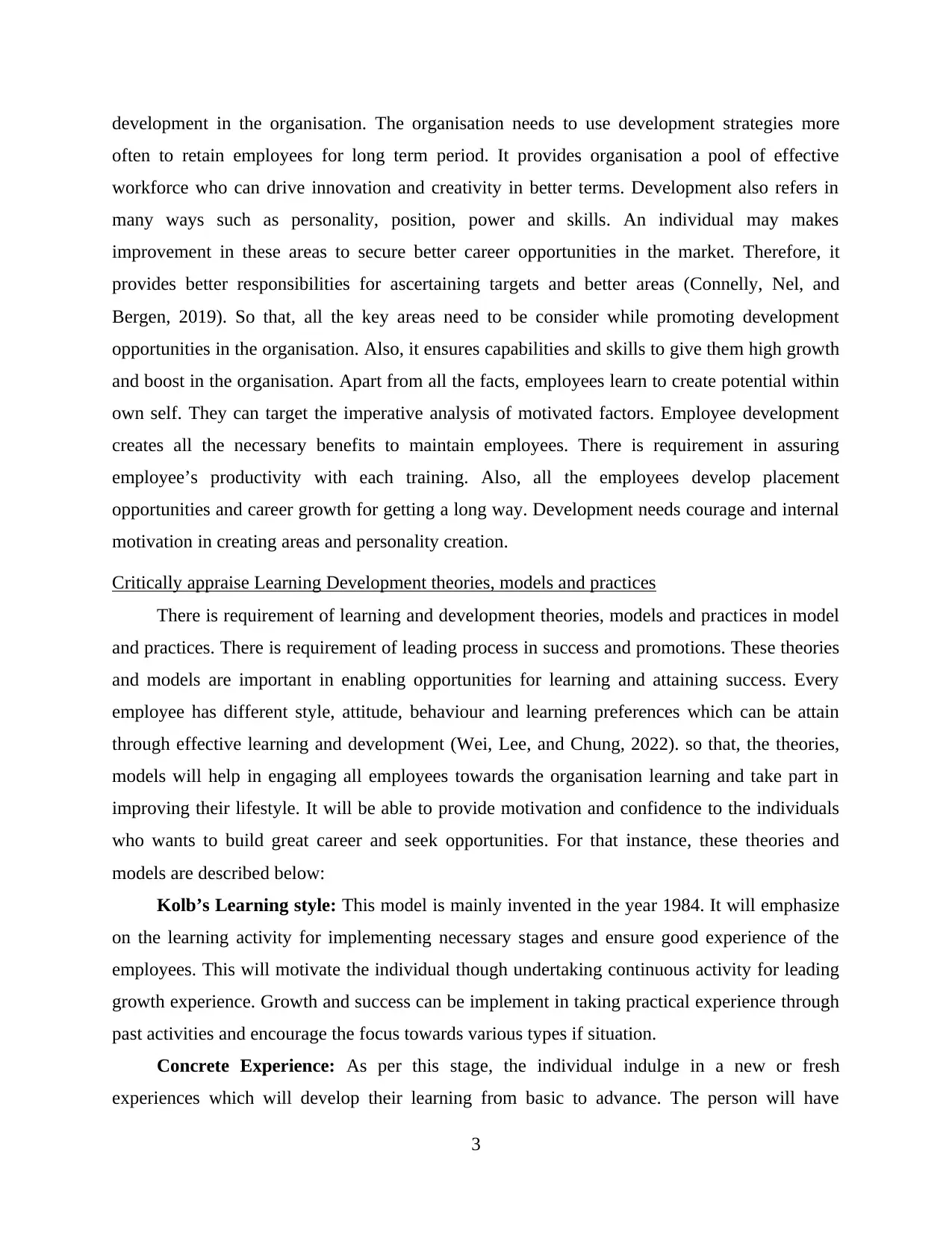
development in the organisation. The organisation needs to use development strategies more
often to retain employees for long term period. It provides organisation a pool of effective
workforce who can drive innovation and creativity in better terms. Development also refers in
many ways such as personality, position, power and skills. An individual may makes
improvement in these areas to secure better career opportunities in the market. Therefore, it
provides better responsibilities for ascertaining targets and better areas (Connelly, Nel, and
Bergen, 2019). So that, all the key areas need to be consider while promoting development
opportunities in the organisation. Also, it ensures capabilities and skills to give them high growth
and boost in the organisation. Apart from all the facts, employees learn to create potential within
own self. They can target the imperative analysis of motivated factors. Employee development
creates all the necessary benefits to maintain employees. There is requirement in assuring
employee’s productivity with each training. Also, all the employees develop placement
opportunities and career growth for getting a long way. Development needs courage and internal
motivation in creating areas and personality creation.
Critically appraise Learning Development theories, models and practices
There is requirement of learning and development theories, models and practices in model
and practices. There is requirement of leading process in success and promotions. These theories
and models are important in enabling opportunities for learning and attaining success. Every
employee has different style, attitude, behaviour and learning preferences which can be attain
through effective learning and development (Wei, Lee, and Chung, 2022). so that, the theories,
models will help in engaging all employees towards the organisation learning and take part in
improving their lifestyle. It will be able to provide motivation and confidence to the individuals
who wants to build great career and seek opportunities. For that instance, these theories and
models are described below:
Kolb’s Learning style: This model is mainly invented in the year 1984. It will emphasize
on the learning activity for implementing necessary stages and ensure good experience of the
employees. This will motivate the individual though undertaking continuous activity for leading
growth experience. Growth and success can be implement in taking practical experience through
past activities and encourage the focus towards various types if situation.
Concrete Experience: As per this stage, the individual indulge in a new or fresh
experiences which will develop their learning from basic to advance. The person will have
3
often to retain employees for long term period. It provides organisation a pool of effective
workforce who can drive innovation and creativity in better terms. Development also refers in
many ways such as personality, position, power and skills. An individual may makes
improvement in these areas to secure better career opportunities in the market. Therefore, it
provides better responsibilities for ascertaining targets and better areas (Connelly, Nel, and
Bergen, 2019). So that, all the key areas need to be consider while promoting development
opportunities in the organisation. Also, it ensures capabilities and skills to give them high growth
and boost in the organisation. Apart from all the facts, employees learn to create potential within
own self. They can target the imperative analysis of motivated factors. Employee development
creates all the necessary benefits to maintain employees. There is requirement in assuring
employee’s productivity with each training. Also, all the employees develop placement
opportunities and career growth for getting a long way. Development needs courage and internal
motivation in creating areas and personality creation.
Critically appraise Learning Development theories, models and practices
There is requirement of learning and development theories, models and practices in model
and practices. There is requirement of leading process in success and promotions. These theories
and models are important in enabling opportunities for learning and attaining success. Every
employee has different style, attitude, behaviour and learning preferences which can be attain
through effective learning and development (Wei, Lee, and Chung, 2022). so that, the theories,
models will help in engaging all employees towards the organisation learning and take part in
improving their lifestyle. It will be able to provide motivation and confidence to the individuals
who wants to build great career and seek opportunities. For that instance, these theories and
models are described below:
Kolb’s Learning style: This model is mainly invented in the year 1984. It will emphasize
on the learning activity for implementing necessary stages and ensure good experience of the
employees. This will motivate the individual though undertaking continuous activity for leading
growth experience. Growth and success can be implement in taking practical experience through
past activities and encourage the focus towards various types if situation.
Concrete Experience: As per this stage, the individual indulge in a new or fresh
experiences which will develop their learning from basic to advance. The person will have
3
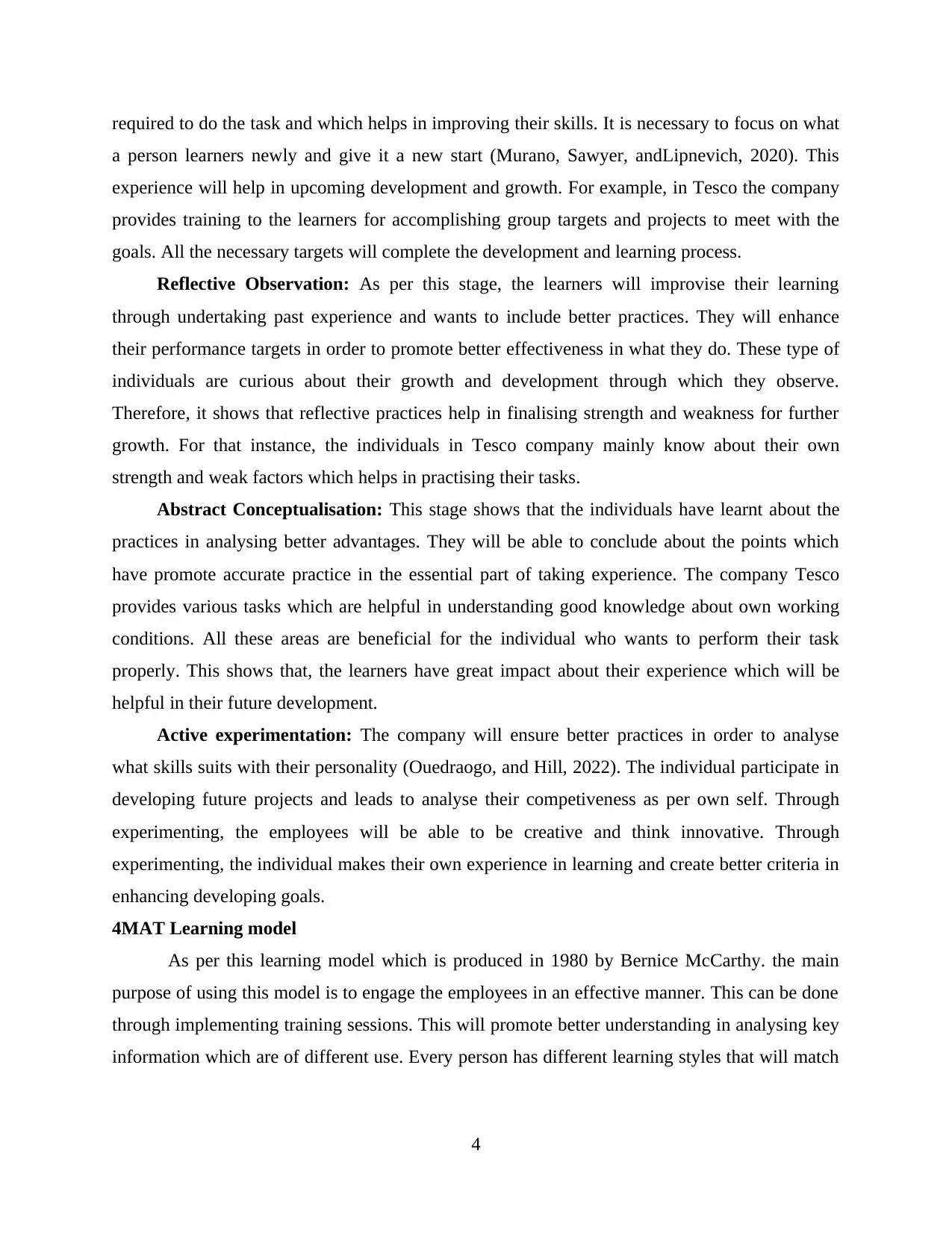
required to do the task and which helps in improving their skills. It is necessary to focus on what
a person learners newly and give it a new start (Murano, Sawyer, andLipnevich, 2020). This
experience will help in upcoming development and growth. For example, in Tesco the company
provides training to the learners for accomplishing group targets and projects to meet with the
goals. All the necessary targets will complete the development and learning process.
Reflective Observation: As per this stage, the learners will improvise their learning
through undertaking past experience and wants to include better practices. They will enhance
their performance targets in order to promote better effectiveness in what they do. These type of
individuals are curious about their growth and development through which they observe.
Therefore, it shows that reflective practices help in finalising strength and weakness for further
growth. For that instance, the individuals in Tesco company mainly know about their own
strength and weak factors which helps in practising their tasks.
Abstract Conceptualisation: This stage shows that the individuals have learnt about the
practices in analysing better advantages. They will be able to conclude about the points which
have promote accurate practice in the essential part of taking experience. The company Tesco
provides various tasks which are helpful in understanding good knowledge about own working
conditions. All these areas are beneficial for the individual who wants to perform their task
properly. This shows that, the learners have great impact about their experience which will be
helpful in their future development.
Active experimentation: The company will ensure better practices in order to analyse
what skills suits with their personality (Ouedraogo, and Hill, 2022). The individual participate in
developing future projects and leads to analyse their competiveness as per own self. Through
experimenting, the employees will be able to be creative and think innovative. Through
experimenting, the individual makes their own experience in learning and create better criteria in
enhancing developing goals.
4MAT Learning model
As per this learning model which is produced in 1980 by Bernice McCarthy. the main
purpose of using this model is to engage the employees in an effective manner. This can be done
through implementing training sessions. This will promote better understanding in analysing key
information which are of different use. Every person has different learning styles that will match
4
a person learners newly and give it a new start (Murano, Sawyer, andLipnevich, 2020). This
experience will help in upcoming development and growth. For example, in Tesco the company
provides training to the learners for accomplishing group targets and projects to meet with the
goals. All the necessary targets will complete the development and learning process.
Reflective Observation: As per this stage, the learners will improvise their learning
through undertaking past experience and wants to include better practices. They will enhance
their performance targets in order to promote better effectiveness in what they do. These type of
individuals are curious about their growth and development through which they observe.
Therefore, it shows that reflective practices help in finalising strength and weakness for further
growth. For that instance, the individuals in Tesco company mainly know about their own
strength and weak factors which helps in practising their tasks.
Abstract Conceptualisation: This stage shows that the individuals have learnt about the
practices in analysing better advantages. They will be able to conclude about the points which
have promote accurate practice in the essential part of taking experience. The company Tesco
provides various tasks which are helpful in understanding good knowledge about own working
conditions. All these areas are beneficial for the individual who wants to perform their task
properly. This shows that, the learners have great impact about their experience which will be
helpful in their future development.
Active experimentation: The company will ensure better practices in order to analyse
what skills suits with their personality (Ouedraogo, and Hill, 2022). The individual participate in
developing future projects and leads to analyse their competiveness as per own self. Through
experimenting, the employees will be able to be creative and think innovative. Through
experimenting, the individual makes their own experience in learning and create better criteria in
enhancing developing goals.
4MAT Learning model
As per this learning model which is produced in 1980 by Bernice McCarthy. the main
purpose of using this model is to engage the employees in an effective manner. This can be done
through implementing training sessions. This will promote better understanding in analysing key
information which are of different use. Every person has different learning styles that will match
4
⊘ This is a preview!⊘
Do you want full access?
Subscribe today to unlock all pages.

Trusted by 1+ million students worldwide
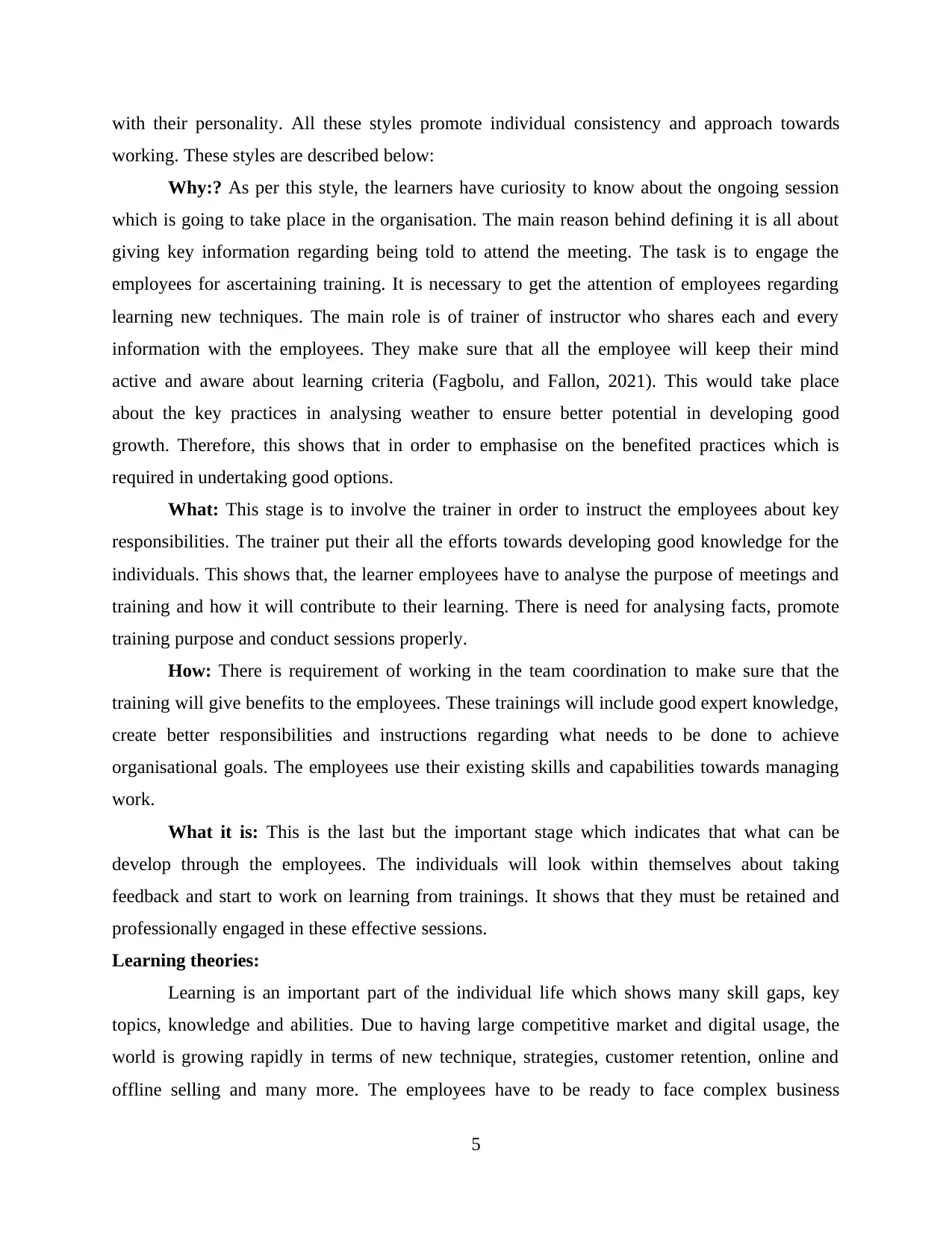
with their personality. All these styles promote individual consistency and approach towards
working. These styles are described below:
Why:? As per this style, the learners have curiosity to know about the ongoing session
which is going to take place in the organisation. The main reason behind defining it is all about
giving key information regarding being told to attend the meeting. The task is to engage the
employees for ascertaining training. It is necessary to get the attention of employees regarding
learning new techniques. The main role is of trainer of instructor who shares each and every
information with the employees. They make sure that all the employee will keep their mind
active and aware about learning criteria (Fagbolu, and Fallon, 2021). This would take place
about the key practices in analysing weather to ensure better potential in developing good
growth. Therefore, this shows that in order to emphasise on the benefited practices which is
required in undertaking good options.
What: This stage is to involve the trainer in order to instruct the employees about key
responsibilities. The trainer put their all the efforts towards developing good knowledge for the
individuals. This shows that, the learner employees have to analyse the purpose of meetings and
training and how it will contribute to their learning. There is need for analysing facts, promote
training purpose and conduct sessions properly.
How: There is requirement of working in the team coordination to make sure that the
training will give benefits to the employees. These trainings will include good expert knowledge,
create better responsibilities and instructions regarding what needs to be done to achieve
organisational goals. The employees use their existing skills and capabilities towards managing
work.
What it is: This is the last but the important stage which indicates that what can be
develop through the employees. The individuals will look within themselves about taking
feedback and start to work on learning from trainings. It shows that they must be retained and
professionally engaged in these effective sessions.
Learning theories:
Learning is an important part of the individual life which shows many skill gaps, key
topics, knowledge and abilities. Due to having large competitive market and digital usage, the
world is growing rapidly in terms of new technique, strategies, customer retention, online and
offline selling and many more. The employees have to be ready to face complex business
5
working. These styles are described below:
Why:? As per this style, the learners have curiosity to know about the ongoing session
which is going to take place in the organisation. The main reason behind defining it is all about
giving key information regarding being told to attend the meeting. The task is to engage the
employees for ascertaining training. It is necessary to get the attention of employees regarding
learning new techniques. The main role is of trainer of instructor who shares each and every
information with the employees. They make sure that all the employee will keep their mind
active and aware about learning criteria (Fagbolu, and Fallon, 2021). This would take place
about the key practices in analysing weather to ensure better potential in developing good
growth. Therefore, this shows that in order to emphasise on the benefited practices which is
required in undertaking good options.
What: This stage is to involve the trainer in order to instruct the employees about key
responsibilities. The trainer put their all the efforts towards developing good knowledge for the
individuals. This shows that, the learner employees have to analyse the purpose of meetings and
training and how it will contribute to their learning. There is need for analysing facts, promote
training purpose and conduct sessions properly.
How: There is requirement of working in the team coordination to make sure that the
training will give benefits to the employees. These trainings will include good expert knowledge,
create better responsibilities and instructions regarding what needs to be done to achieve
organisational goals. The employees use their existing skills and capabilities towards managing
work.
What it is: This is the last but the important stage which indicates that what can be
develop through the employees. The individuals will look within themselves about taking
feedback and start to work on learning from trainings. It shows that they must be retained and
professionally engaged in these effective sessions.
Learning theories:
Learning is an important part of the individual life which shows many skill gaps, key
topics, knowledge and abilities. Due to having large competitive market and digital usage, the
world is growing rapidly in terms of new technique, strategies, customer retention, online and
offline selling and many more. The employees have to be ready to face complex business
5
Paraphrase This Document
Need a fresh take? Get an instant paraphrase of this document with our AI Paraphraser
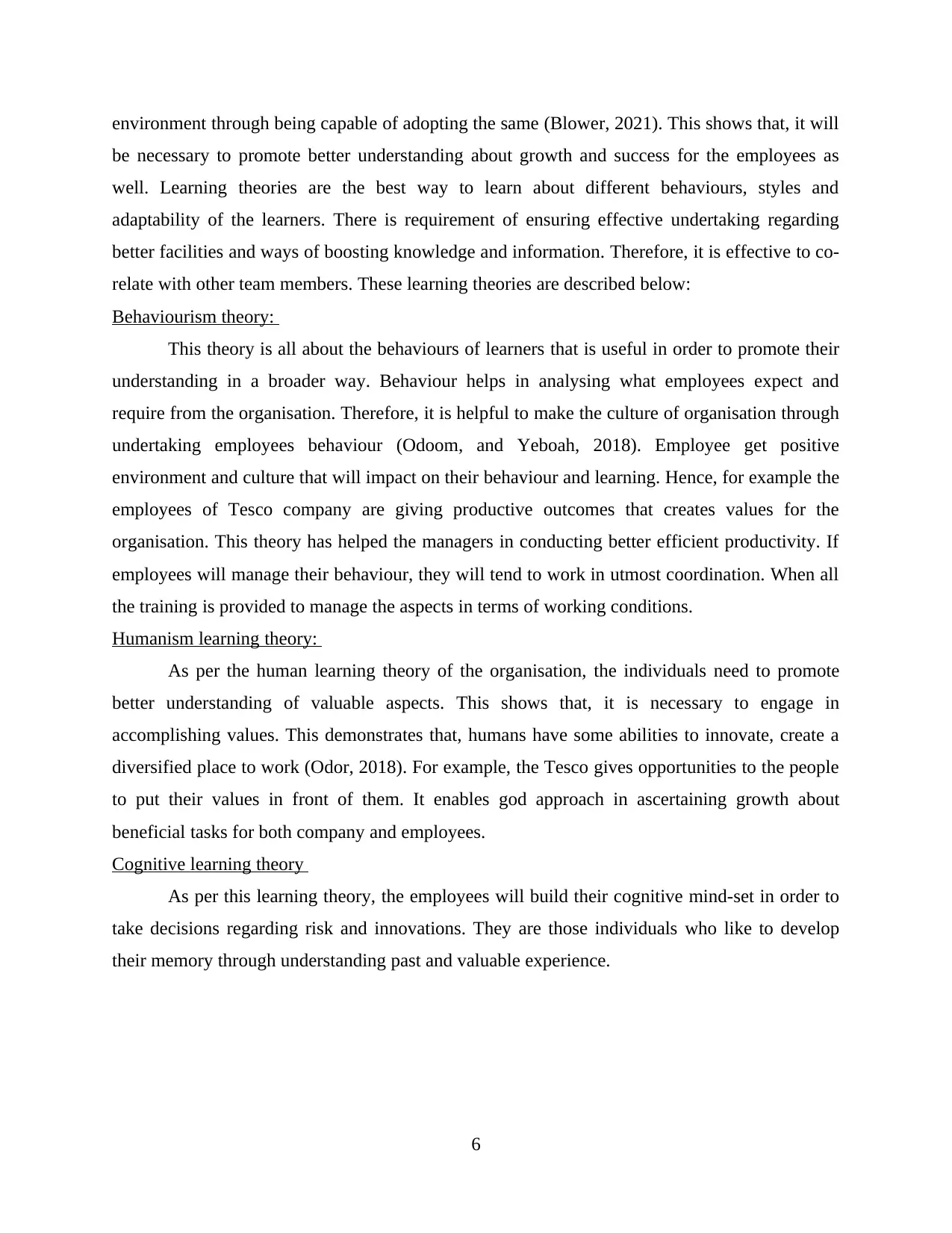
environment through being capable of adopting the same (Blower, 2021). This shows that, it will
be necessary to promote better understanding about growth and success for the employees as
well. Learning theories are the best way to learn about different behaviours, styles and
adaptability of the learners. There is requirement of ensuring effective undertaking regarding
better facilities and ways of boosting knowledge and information. Therefore, it is effective to co-
relate with other team members. These learning theories are described below:
Behaviourism theory:
This theory is all about the behaviours of learners that is useful in order to promote their
understanding in a broader way. Behaviour helps in analysing what employees expect and
require from the organisation. Therefore, it is helpful to make the culture of organisation through
undertaking employees behaviour (Odoom, and Yeboah, 2018). Employee get positive
environment and culture that will impact on their behaviour and learning. Hence, for example the
employees of Tesco company are giving productive outcomes that creates values for the
organisation. This theory has helped the managers in conducting better efficient productivity. If
employees will manage their behaviour, they will tend to work in utmost coordination. When all
the training is provided to manage the aspects in terms of working conditions.
Humanism learning theory:
As per the human learning theory of the organisation, the individuals need to promote
better understanding of valuable aspects. This shows that, it is necessary to engage in
accomplishing values. This demonstrates that, humans have some abilities to innovate, create a
diversified place to work (Odor, 2018). For example, the Tesco gives opportunities to the people
to put their values in front of them. It enables god approach in ascertaining growth about
beneficial tasks for both company and employees.
Cognitive learning theory
As per this learning theory, the employees will build their cognitive mind-set in order to
take decisions regarding risk and innovations. They are those individuals who like to develop
their memory through understanding past and valuable experience.
6
be necessary to promote better understanding about growth and success for the employees as
well. Learning theories are the best way to learn about different behaviours, styles and
adaptability of the learners. There is requirement of ensuring effective undertaking regarding
better facilities and ways of boosting knowledge and information. Therefore, it is effective to co-
relate with other team members. These learning theories are described below:
Behaviourism theory:
This theory is all about the behaviours of learners that is useful in order to promote their
understanding in a broader way. Behaviour helps in analysing what employees expect and
require from the organisation. Therefore, it is helpful to make the culture of organisation through
undertaking employees behaviour (Odoom, and Yeboah, 2018). Employee get positive
environment and culture that will impact on their behaviour and learning. Hence, for example the
employees of Tesco company are giving productive outcomes that creates values for the
organisation. This theory has helped the managers in conducting better efficient productivity. If
employees will manage their behaviour, they will tend to work in utmost coordination. When all
the training is provided to manage the aspects in terms of working conditions.
Humanism learning theory:
As per the human learning theory of the organisation, the individuals need to promote
better understanding of valuable aspects. This shows that, it is necessary to engage in
accomplishing values. This demonstrates that, humans have some abilities to innovate, create a
diversified place to work (Odor, 2018). For example, the Tesco gives opportunities to the people
to put their values in front of them. It enables god approach in ascertaining growth about
beneficial tasks for both company and employees.
Cognitive learning theory
As per this learning theory, the employees will build their cognitive mind-set in order to
take decisions regarding risk and innovations. They are those individuals who like to develop
their memory through understanding past and valuable experience.
6

CONCLUSION
The report has concluded that learning is an essential concept for every person who wants
to achieve great success. It can be done through arising most meaningful learning style and
behaviour of an individual. It will help in using learning platforms and ways which will mostly
effect own personality and skills.
7
The report has concluded that learning is an essential concept for every person who wants
to achieve great success. It can be done through arising most meaningful learning style and
behaviour of an individual. It will help in using learning platforms and ways which will mostly
effect own personality and skills.
7
⊘ This is a preview!⊘
Do you want full access?
Subscribe today to unlock all pages.

Trusted by 1+ million students worldwide
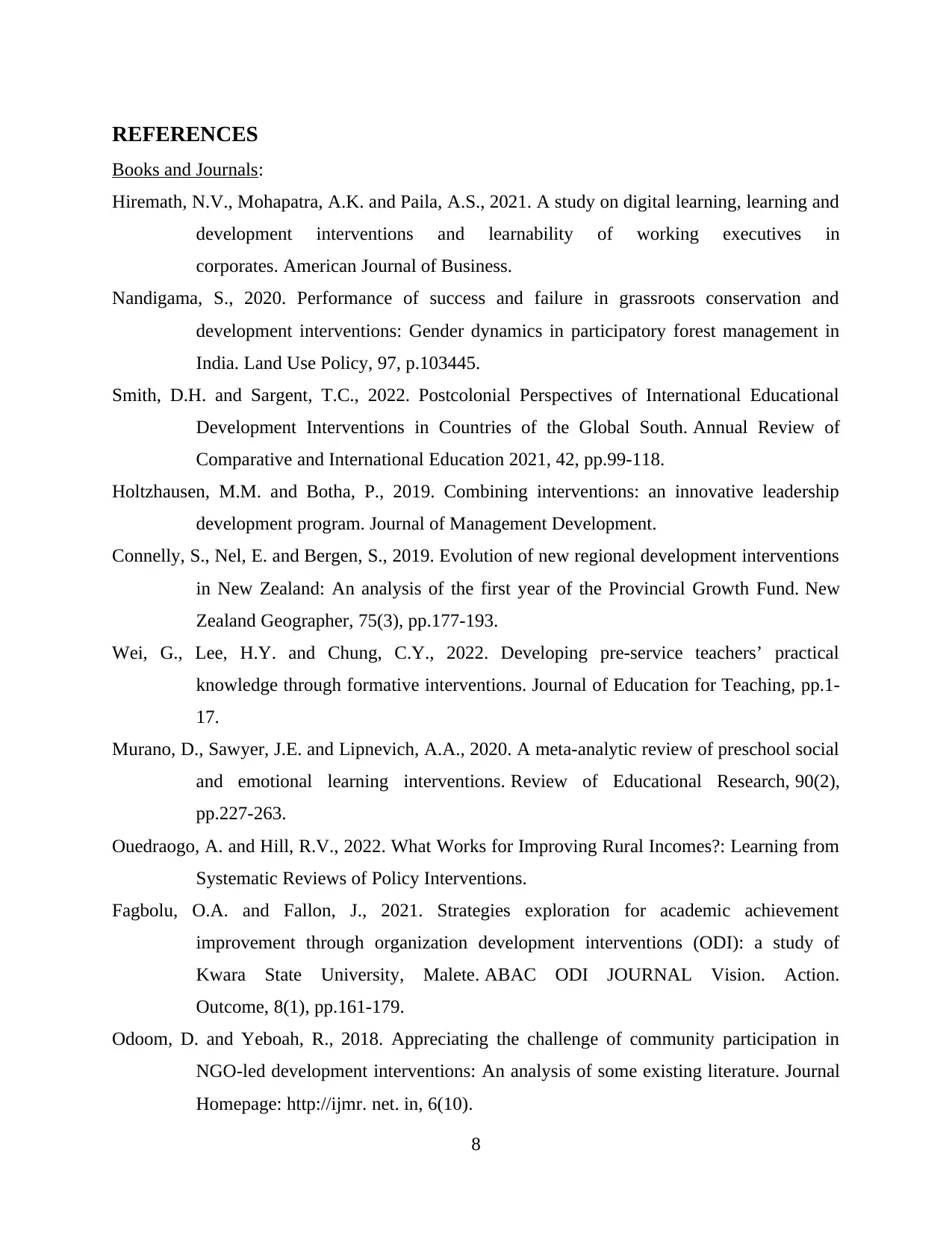
REFERENCES
Books and Journals:
Hiremath, N.V., Mohapatra, A.K. and Paila, A.S., 2021. A study on digital learning, learning and
development interventions and learnability of working executives in
corporates. American Journal of Business.
Nandigama, S., 2020. Performance of success and failure in grassroots conservation and
development interventions: Gender dynamics in participatory forest management in
India. Land Use Policy, 97, p.103445.
Smith, D.H. and Sargent, T.C., 2022. Postcolonial Perspectives of International Educational
Development Interventions in Countries of the Global South. Annual Review of
Comparative and International Education 2021, 42, pp.99-118.
Holtzhausen, M.M. and Botha, P., 2019. Combining interventions: an innovative leadership
development program. Journal of Management Development.
Connelly, S., Nel, E. and Bergen, S., 2019. Evolution of new regional development interventions
in New Zealand: An analysis of the first year of the Provincial Growth Fund. New
Zealand Geographer, 75(3), pp.177-193.
Wei, G., Lee, H.Y. and Chung, C.Y., 2022. Developing pre-service teachers’ practical
knowledge through formative interventions. Journal of Education for Teaching, pp.1-
17.
Murano, D., Sawyer, J.E. and Lipnevich, A.A., 2020. A meta-analytic review of preschool social
and emotional learning interventions. Review of Educational Research, 90(2),
pp.227-263.
Ouedraogo, A. and Hill, R.V., 2022. What Works for Improving Rural Incomes?: Learning from
Systematic Reviews of Policy Interventions.
Fagbolu, O.A. and Fallon, J., 2021. Strategies exploration for academic achievement
improvement through organization development interventions (ODI): a study of
Kwara State University, Malete. ABAC ODI JOURNAL Vision. Action.
Outcome, 8(1), pp.161-179.
Odoom, D. and Yeboah, R., 2018. Appreciating the challenge of community participation in
NGO-led development interventions: An analysis of some existing literature. Journal
Homepage: http://ijmr. net. in, 6(10).
8
Books and Journals:
Hiremath, N.V., Mohapatra, A.K. and Paila, A.S., 2021. A study on digital learning, learning and
development interventions and learnability of working executives in
corporates. American Journal of Business.
Nandigama, S., 2020. Performance of success and failure in grassroots conservation and
development interventions: Gender dynamics in participatory forest management in
India. Land Use Policy, 97, p.103445.
Smith, D.H. and Sargent, T.C., 2022. Postcolonial Perspectives of International Educational
Development Interventions in Countries of the Global South. Annual Review of
Comparative and International Education 2021, 42, pp.99-118.
Holtzhausen, M.M. and Botha, P., 2019. Combining interventions: an innovative leadership
development program. Journal of Management Development.
Connelly, S., Nel, E. and Bergen, S., 2019. Evolution of new regional development interventions
in New Zealand: An analysis of the first year of the Provincial Growth Fund. New
Zealand Geographer, 75(3), pp.177-193.
Wei, G., Lee, H.Y. and Chung, C.Y., 2022. Developing pre-service teachers’ practical
knowledge through formative interventions. Journal of Education for Teaching, pp.1-
17.
Murano, D., Sawyer, J.E. and Lipnevich, A.A., 2020. A meta-analytic review of preschool social
and emotional learning interventions. Review of Educational Research, 90(2),
pp.227-263.
Ouedraogo, A. and Hill, R.V., 2022. What Works for Improving Rural Incomes?: Learning from
Systematic Reviews of Policy Interventions.
Fagbolu, O.A. and Fallon, J., 2021. Strategies exploration for academic achievement
improvement through organization development interventions (ODI): a study of
Kwara State University, Malete. ABAC ODI JOURNAL Vision. Action.
Outcome, 8(1), pp.161-179.
Odoom, D. and Yeboah, R., 2018. Appreciating the challenge of community participation in
NGO-led development interventions: An analysis of some existing literature. Journal
Homepage: http://ijmr. net. in, 6(10).
8
Paraphrase This Document
Need a fresh take? Get an instant paraphrase of this document with our AI Paraphraser
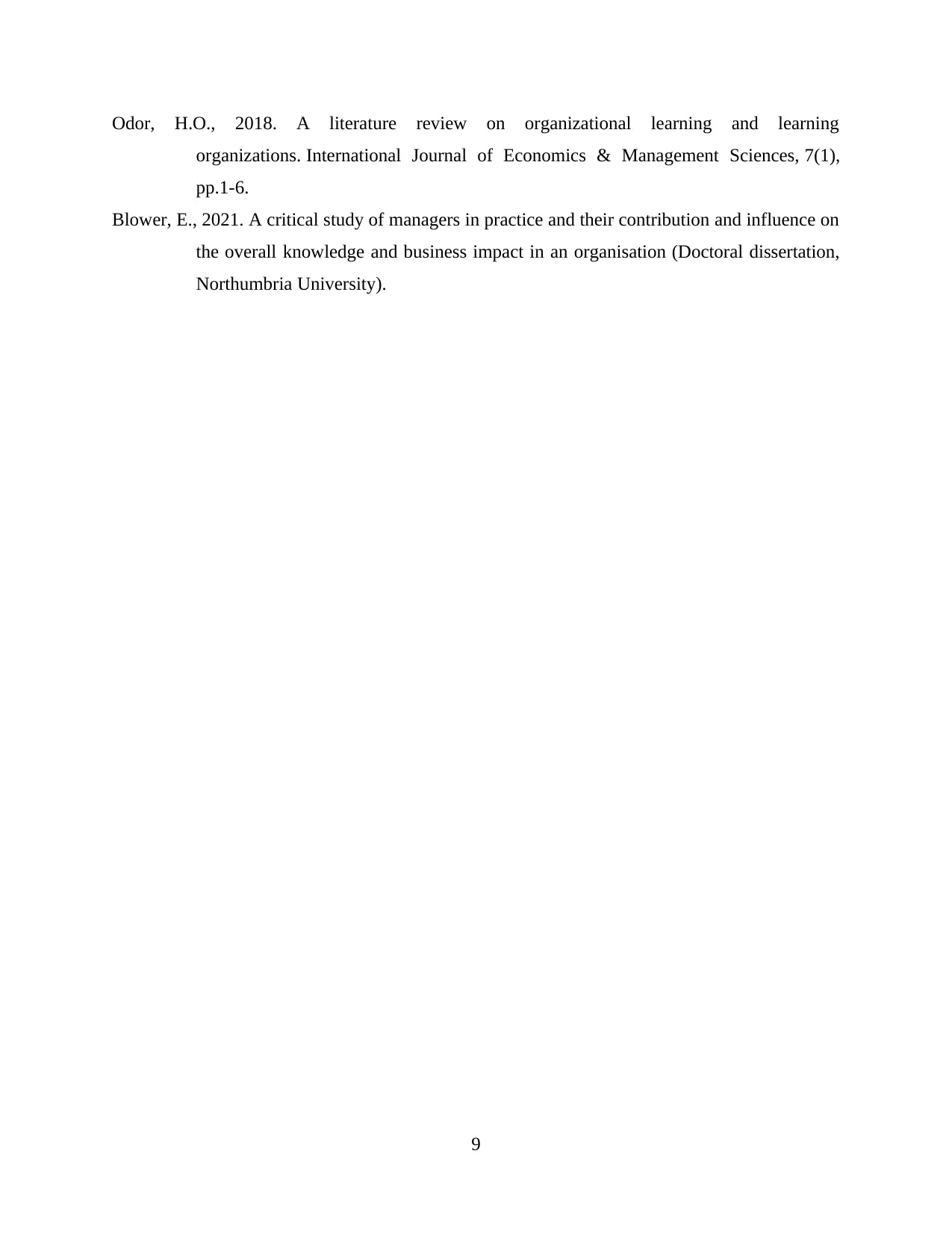
Odor, H.O., 2018. A literature review on organizational learning and learning
organizations. International Journal of Economics & Management Sciences, 7(1),
pp.1-6.
Blower, E., 2021. A critical study of managers in practice and their contribution and influence on
the overall knowledge and business impact in an organisation (Doctoral dissertation,
Northumbria University).
9
organizations. International Journal of Economics & Management Sciences, 7(1),
pp.1-6.
Blower, E., 2021. A critical study of managers in practice and their contribution and influence on
the overall knowledge and business impact in an organisation (Doctoral dissertation,
Northumbria University).
9
1 out of 11
Related Documents
Your All-in-One AI-Powered Toolkit for Academic Success.
+13062052269
info@desklib.com
Available 24*7 on WhatsApp / Email
![[object Object]](/_next/static/media/star-bottom.7253800d.svg)
Unlock your academic potential
Copyright © 2020–2026 A2Z Services. All Rights Reserved. Developed and managed by ZUCOL.





